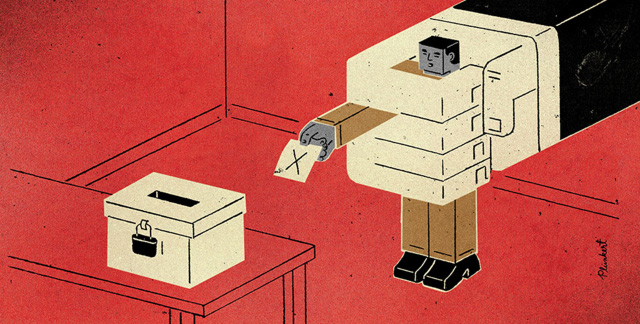sierraclub.org - sierra magazine - july/august 2012 - grapple: can i see your id?
Can I See Your ID? | The Universe of Oil | Fuzzy, Sexy Killers | Greenwashing Golf |
The Sock Gremlin | On the One Hand ... | Shredded Paper Will Save Us | Up to Speed
CAN I SEE YOUR ID?
New state laws disenfranchise environmental voters

David Plunkert
Say you're a large U.S. corporation with an interest in defeating pro-environmental candidates for public office. Which voters would you most want to keep away from the voting booth? At the top of your list would be Latinos, African Americans, and young people.
According to polls, all three groups strongly and consistently support environmental issues. A Pew poll from March 2011, for example, found that 82 percent of 18- to 30-year-olds support increased federal funding for alternative energy, compared with just 54 percent of those over age 66. And when asked whether climate change is a "very serious" problem, 59 percent of Caucasians agree, while 69 percent of African Americans and 74 percent of Latinos do.
Now, just in time for November's general election, comes a coordinated plan to disenfranchise those green voters. Acting from cookie-cutter legislative templates furnished by the corporate-financed American Legislative Exchange Council, 176 bills to restrict voting rights have been introduced in 41 states since the beginning of 2011, and bills have passed—or are on the verge of passing—in 14. The ostensible reason for the legislation is to eliminate the threat of voter fraud—in the words of Kansas governor Sam Brownback, to "ensure the sanctity of the vote."
Voting fraud, however, is so rare that it borders on nonexistent. A study by the Brennan Center for Justice at New York University School of Law found that a person is more likely to be struck by lightning than to commit voter-impersonation fraud. In South Carolina, Governor Nikki Haley supported voting restrictions on the grounds that she didn't "want dead people voting." The state's election commission conducted a study of 207 votes by "allegedly dead people" in the 2010 election. It found that more than half were attributable to clerical errors, 56 involved people who were not in fact dead, 3 were absentee ballots cast by voters who died before Election Day, and the remaining 10 were cases of "insufficient information." Evidence of zombie voting: 0.
Efforts to solve this phony problem vary from state to state. Alabama, Kansas, and Tennessee require would-be voters to present proof of citizenship prior to registration. Florida makes voter registration so onerous that the League of Women Voters has ceased its registration efforts there. The most common suppression laws, however, require voters to show a specific form of photo ID at the polls. In Texas, licenses to carry concealed firearms are considered valid, while student IDs are not.
Twenty-one million American citizens, in fact, lack the kind of photo ID that would pass muster under these laws. Among that number are 18 percent of young eligible voters, nearly 11 percent of Latinos, and 25 percent of African Americans. Because of the laws' discriminatory effect, the Justice Department has been able to block voter ID laws in states with prior histories of discrimination—such as South Carolina and Texas—under the Voting Rights Act. Elsewhere, however, even though U.S. Attorney General Eric Holder has said that making it harder for people to vote "goes against the arc of history," the feds have declined to take action.
So this November, millions of eligible voters may find themselves denied the opportunity to cast a ballot. To forestall that possibility, various groups are challenging voter-suppression laws on a state-by-state basis. In Pennsylvania, for example, the ACLU and the NAACP are suing to overturn that state's voter ID law. Their lead plaintiff is Viviette Applewhite, a 93-year-old woman who marched with Martin Luther King Jr. in Macomb, Georgia, and has voted regularly since casting her ballot for John F. Kennedy in 1960. She never learned to drive and lost her photo ID when her purse was stolen years ago. She's tried to obtain a new ID, but the state can't find her birth certificate and so won't issue one.
"I think it stinks," Applewhite says in an ACLU video. "It's the most ridiculous thing I ever heard of. I got in line and marched with [King]. There was so many rights we did not have. The way they take them away, we'll be right back where we were before." —Paul Rauber
This article has been corrected.
The Universe of Oil